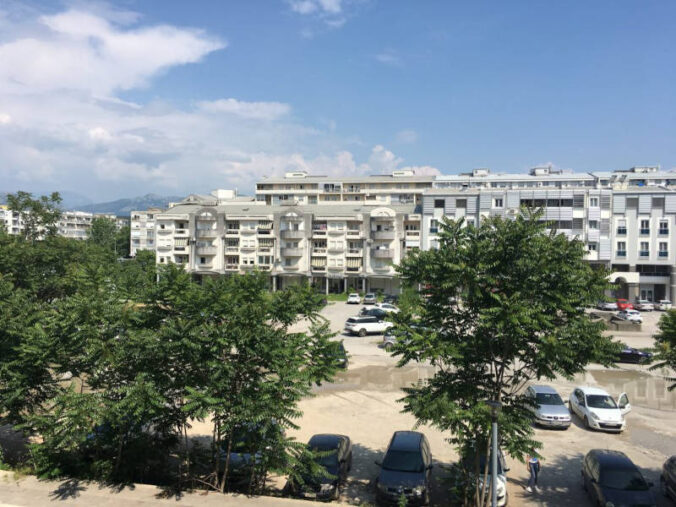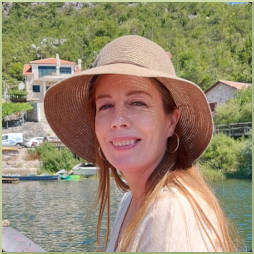In my first few months in Podgorica, I stayed in several Airbnb apartments as well as different rental apartments (more than most locals in their entire lives). Having gone through the full process of searching, renting, signing contracts, and moving in and out, here is what I have learned about the quirks of apartments and renting in Podgorica.
Types of Apartments in Podgorica
Unlike Australia or the US, most people in Podgorica live in apartments. Apartment types are garsonera (studio), jednosoban (one bedroom), dvosoban (two bedroom), and trosoban (three bedroom).
Studio apartments usually one room with a kitchen and a separate bathroom. They have a couch or sofa-bed for sleeping rather than a regular bed, as you’d normally find in English-speaking countries. A studio can be rented from 200 euro a month.
One bedroom apartments have a separate bedroom with a double bed. Depending on your area, one bedroom apartments will start around 250 – 280 euro a month for an unrenovated apartment in an old building and go up from there. Newer buildings with a lift, renovations, etc, will increase the price.
Older-style apartments are organised with separate rooms with doors (lots and lots of doors) for the entry hall, kitchen and dining area, lounge and bedroom. The newer the building the more open plan the apartments will be, usually combining the lounge and dining with the kitchen, and sometimes everything but the bathroom and bedroom in one large space.
Apartment Features in Podgorica
There are some apartment features in Montenegro that were completely new to me, mostly to do with bathrooms and apartment windows. I was either baffled or excited on my first encounters.
In the bathroom, the showers are generally over the bath, and the shower head is on a long lead and hand-held instead of being mounted on the wall. For locals, this way is more efficient to wash yourself and to save water. For me, this means either long periods of being cold in winter or learning to wash my hair with one hand.
The washing machine is usually also in the bathroom providing some sorely needed extra flat space. There won’t be a dryer (there’s not enough space for that), so clothes are dried on a rack on your terrace or in the loungeroom.
The bathroom has its own water heater with a switch outside the bathroom with the light switch. Remembering this is really important, in order to avoid inadvertant cold showers. You can turn it off when you go away to save electricity, or leave it on to prevent an annoying wait once you get home because you forgot it was off (my preferred method).
Outside the bathroom, my absolute favourite feature is the metal rolldown shutters on the outside of all the external windows. You can drop these to stop the apartment heating up in the daytime, or, even better, have a bedroom in complete darkness at night. Every bedroom has in-built blackout blinds!
In second place for my favourite feature are double-glazed windows. These are non-existent in Australia and so I still get excited that I can actually block out external noise, cold and heat. Older apartments can have two layers of wooden windows, but most apartments you would rent as a foreigner have modern aluminium, PVC, or wood double-paned windows and doors.
Most apartments also have really lovely wooden parquetry floors (nothing is ever carpeted). They also have terraces or at least French windows – essential in a country of smokers.
One other local quirk is that top floor apartments are considered highly undesirable (so much so that higher floor apartments will be described as ‘not the last’ in listings). I was a little confused by this at first because the top floor means no-one stomping around above your head; to locals it means possible leaky ceilings, a probable lack of insulation, and so three months or more living in an oven in Podgorica’s hot summers.
Finding an Apartment
There are two websites for real estate listings, Realitica and Oglasi.me, and multiple agency websites. Unless you speak the local language, the agencies will be your best bet.
Realitica can be deceptive – it looks full of potential apartments but in reality is full of old (and possibly fake) listings. I enquired about twenty or so apartments and about two-thirds were unavailable, even when the listing had gone online minutes before. It is useful to get a gauge of prices and how apartments look, and to find new agents you haven’t yet dealt with, but that’s about it.
The local real estate agencies are much more helpful. They have a lot of listings that aren’t online yet and will even drive you around personally to show them. You can try emailing agents before you arrive but unless you have a diplomat’s budget it’s unlikely you’ll get a lot of replies. Most effective is to contact individual agents via Viber message when you arrive and ask for their apartments for rent in your price range and area.
Here are a few agencies that I found helpful and which have agents who speak English:
Quite often when you view an apartment the owner will be there as well as the agent. I usually found myself in a crowd of people while I was looking around… the owner, owner’s friend, a couple of agents… I met a lot of people while apartment hunting!
Where to Rent in Podgorica
There are no real unsafe areas in Podgorica to avoid, but some areas are more popular with foreigners and have more cafes, restaurants and shops than others.
My favourite area is Preko Morače (which Google calls Novi Grad for some mysterious reason), one of the more desirable areas locally. It’s not far from downtown, has the cathedral and nice boulevards with trees, and millions of cafes, banks, supermarkets and little shops. There are many old solid apartment buildings with the odd new one crammed in between them. It is a little more expensive than other areas, as it’s desirable and also because there is no more space to expand with new buildings.
North of Preko Morace, along the river, is Momišići. Considered a more posh area, it has apartment buildings that run alongside the Morača and many have river views.
Another very popular area is City Kvart, a new suburb next to Delta City, the shopping mall. You could spend your entire life just in City Kvart and Delta as there are millions of cafes and bars and shops and businesses, but the downside is an almost complete lack of trees, parks or green space. On the upside, are so many new apartment buildings there are always new and newly renovated apartments to rent.
Other options are Gorica and Stari Aerodrom. Gorica is traditionally an expensive area where politicians live and where embassies are located. It’s next to (and named after) the hill Gorica, which is a nice area of trees and running trails with views over the city. Stari Aerodrom is another area of large apartment buildings and services, and some nice clear views to the east. Best if you have a car.
Renting an Apartment
Once you have found an apartment you want and made a verbal agreement with the agency and owner, it’s a very simple process. The agency needs a copy of your passport, the first month’s rent, and a deposit. The deposit is the same amount as a month’s rent.
A 12 month contract is typical, but renting is flexible so other clauses might be negotiated with the owner. The agent will put together a contract in English and in Montenegrin (this might take a few days).
Once completed, you will usually go to the apartment with the owner and the agent to check on its condition, everyone signs the contract, and you get the keys.
Utilities & Furniture
Utilities are normally left in the owner’s name, so there’s no need to even deal with electricity companies or Internet providers. The agency sends you copies of the bills each month and you pay them the total.
Cable TV and Internet are sometimes but not always included in the rental price, as is the building ‘entrance fee’, which pays for common area upkeep. Electricity and water will always be paid by you, the renter.
Air conditioning is very common in both lounge rooms and bedrooms, and often also used for winter heating. Winters are not that cold by global standards (it snows once every three or four years) but the winter wind from the north is VERY STRONG and VERY COLD. Apartments facing north will be cold all winter; facing south hot all summer. There’s no real best option, it’s up to your own preference.
Most apartments are rented furnished, down to plates, cutlery, sheets and towels, making it very easy to move in as as expat or foreigner. You can normally ask the owner to provide a few things if they are not already there (a vacuum cleaner, for example).
Rubbish Disposal
It’s very rare for a building or house to have their own garbage bins (aka rubbish bins or trash bins). There are usually open-topped grey metal four-wheeled containers somewhere in a fifty metre vicinity of your building. In the centre, they might be large round bins that are fixed in the ground and have black plastic lids.
To find your bin, follow any neighbour leaving your building that appears to be carrying a supermarket bag full of rubbish.
Leaving an Apartment
Generally you will leave at the end of the lease, or there may be a clause in your contract to break it with 30 days notice (beware, you will probably still lose your deposit).
When leaving, you’ll meet the owner and agent at the apartment to check its condition, then sign a contract that everything was in good order. Once you have paid any outstanding utliity bills, you will get your deposit back.
While finding an apartment can have its ups and down, I’ve found the actual process of living in and renting an apartment in Podgorica is much more simple – and more human – than in many other countries.


Hello Kate, thank you for detailed information. Can you please advise on a law offices who can help with obtaining a residence. I plan to visit Podgoriza in December of this year.
Hi Elena, get in touch with Ekonomik.co
Hi Kate,
Thanks for all the info.. wow.. nicely done… there are 3 links nog working on your page: Tender Oglasi, Atos Nekretnine and Fresh Nekretnine.
Thanks John, I’ve updated all the links.